Unit 5 Can you come to my party 单元复习课件(共19张PPT)
文档属性
| 名称 | Unit 5 Can you come to my party 单元复习课件(共19张PPT) |
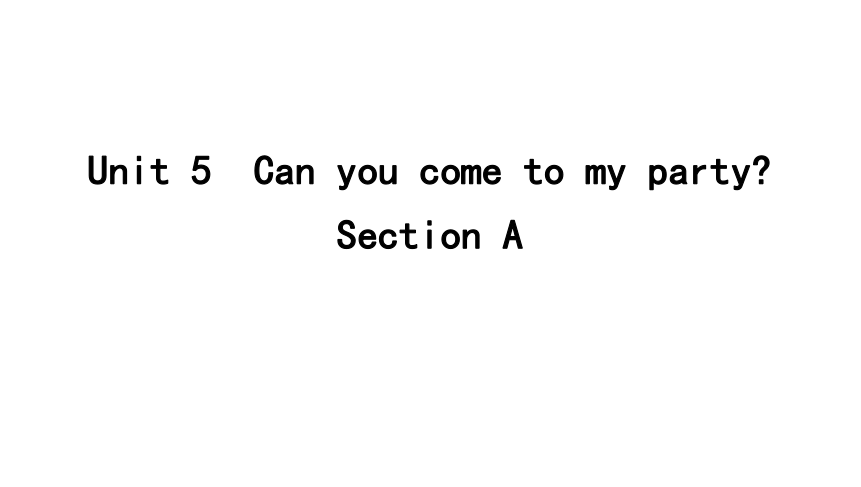
|
|
| 格式 | pptx | ||
| 文件大小 | 93.9KB | ||
| 资源类型 | 教案 | ||
| 版本资源 | 鲁教版 | ||
| 科目 | 英语 | ||
| 更新时间 | 2024-07-06 00:00:00 | ||
图片预览

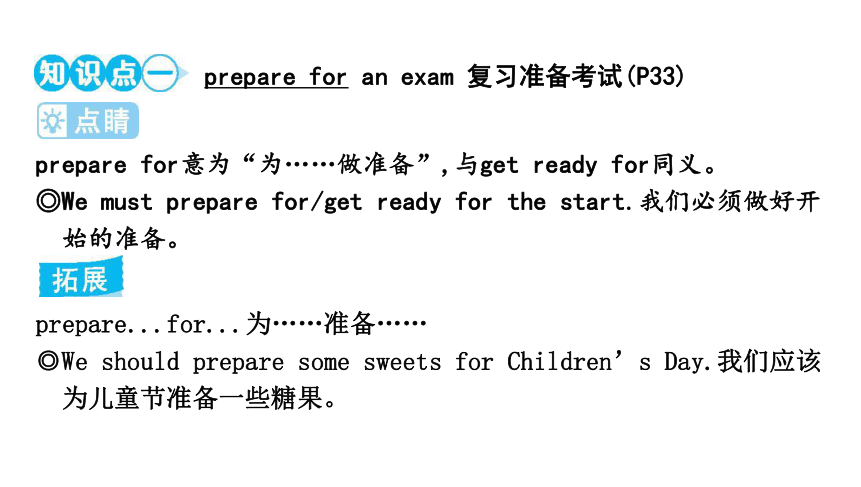
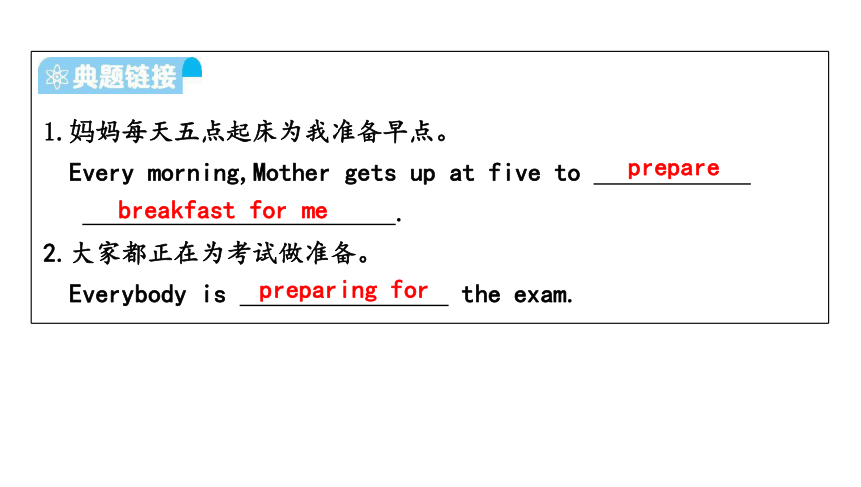
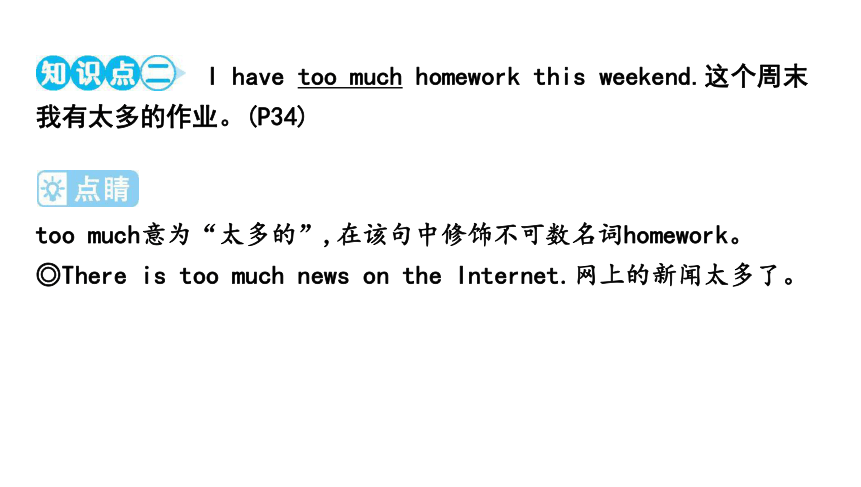
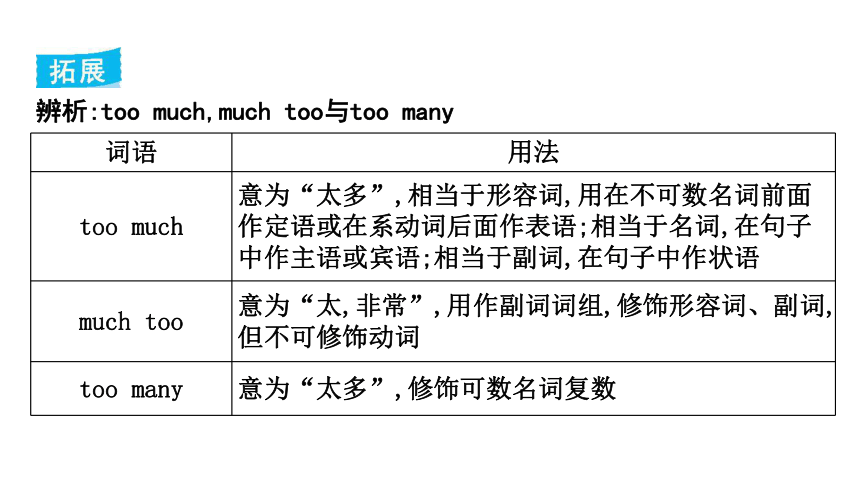
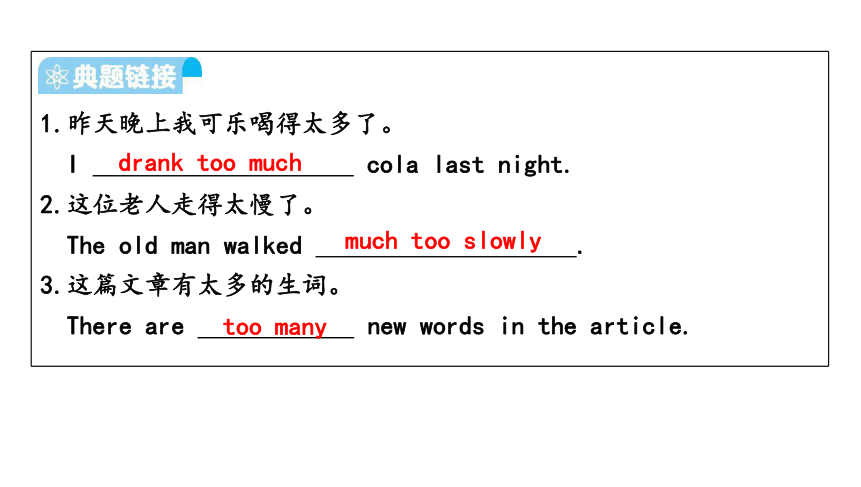
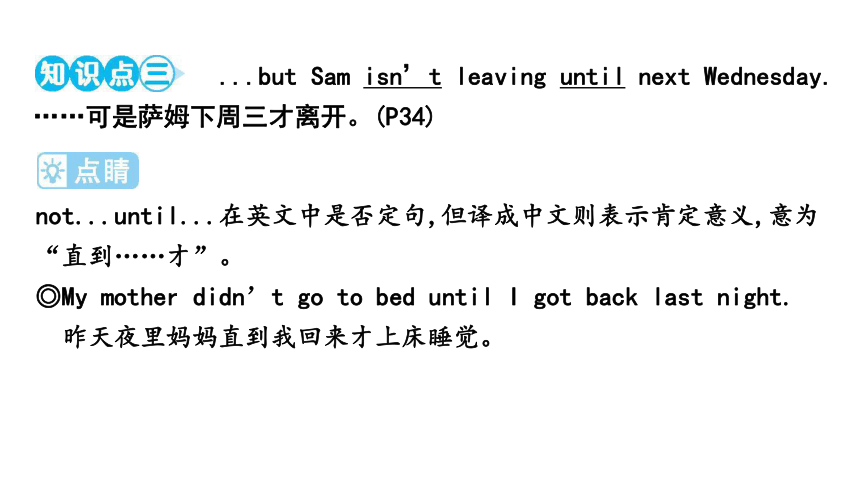
文档简介
(共19张PPT)
Unit 5 Can you come to my party
Section A
prepare for an exam 复习准备考试(P33)
prepare for意为“为……做准备”,与get ready for同义。
◎We must prepare for/get ready for the start.我们必须做好开
始的准备。
prepare...for...为……准备……
◎We should prepare some sweets for Children’s Day.我们应该
为儿童节准备一些糖果。
1.妈妈每天五点起床为我准备早点。
Every morning,Mother gets up at five to .
.
2.大家都正在为考试做准备。
Everybody is the exam.
prepare
breakfast for me
preparing for
I have too much homework this weekend.这个周末我有太多的作业。(P34)
too much意为“太多的”,在该句中修饰不可数名词homework。
◎There is too much news on the Internet.网上的新闻太多了。
辨析:too much,much too与too many
词语 用法
too much 意为“太多”,相当于形容词,用在不可数名词前面作定语或在系动词后面作表语;相当于名词,在句子中作主语或宾语;相当于副词,在句子中作状语
much too 意为“太,非常”,用作副词词组,修饰形容词、副词,但不可修饰动词
too many 意为“太多”,修饰可数名词复数
1.昨天晚上我可乐喝得太多了。
I cola last night.
2.这位老人走得太慢了。
The old man walked .
3.这篇文章有太多的生词。
There are new words in the article.
drank too much
much too slowly
too many
...but Sam isn’t leaving until next Wednesday.
……可是萨姆下周三才离开。(P34)
not...until...在英文中是否定句,但译成中文则表示肯定意义,意为“直到……才”。
◎My mother didn’t go to bed until I got back last night.
昨天夜里妈妈直到我回来才上床睡觉。
1.until用于肯定句中,主句动词常为延续性动词,表示这个动作一直
延续到until所表示的时间为止。
◎He will wait until your mother comes.他将等到你母亲来。
2.until用于否定句中,意为“直到……才”,主句常用终止性动词(即
非延续性动词),表示until所表示的时间一到,该动作就发生。
◎They didn’t start the dinner until Jack came.他们直到杰克
来了才开始吃晚饭。
1.我一直睡到今早八点钟。
I 8 o’clock this morning.
2.她来了你才能走。
You until she comes.
slept until
can’t go
Section B
What a great idea!多好的主意啊!(P37)
该句为what引导的感叹句,这种感叹句的结构为“What +a/an+形容词+可数名词单数(+主语+谓语)!”,原句中省略了主语和谓语it is。
◎What an interesting book it is!这是一本多么有趣的书啊!
其他结构的感叹句
(1)What +形容词+可数名词复数/不可数名词(+主语+谓语)!
◎What good children(they are)!多好的孩子们啊!
(2)How+形容词/副词+主语+谓语!
◎How beautiful these flowers are!这些花多美啊!
◎How clearly he is speaking!他说得多么清楚啊!
(3)How+主语+谓语!
◎How time flies!时间过得真快啊!
1. silly you are!Why not tell it to your parents
2. fine weather it is!We can go to the hill to have
a picnic.
3. beautiful flowers they are!
4. trip it is!I like it a lot.
How
What
What
What a
Bring Ms.Steen to the party without telling her so that she can be surprised.事先不通知斯蒂恩女士就把她带到聚会上来,就是为了让她惊讶。(P37)
1.so that意为“以便”,引导的是目的状语从句,表达的内容是前面
主句的行为要达到的目的。
◎I give you the key so that you can let yourself in.
我把钥匙给你,你可以自己开门进去。
2.without是介词,意为“无;没有”,注意后跟名词、代词或v.-ing作
介词的宾语。
◎Nothing could live without water.没有水什么也活不了。
◎He left without saying anything.他什么也没说就离开了。
3.surprised作形容词,意为“感到惊讶的”。
◎I felt very surprised at the result of the exam.我对考试
结果感到非常惊讶。
surprising意为“令人惊讶的”,用来形容事物。
Your success is surprising.你们的成功使人吃惊。
1.We couldn’t have finished our work so early .
(with) your help.
2.He left the classroom without (say) a word.
3.—It is very (surprise) that he got first prize.
—That’s it.Everyone is so (surprise) at it.
4.I looked through my test paper again and again so that I
wouldn’t make any mistakes.
without
saying
surprising
surprised
我把试卷检查了一遍又一遍,以免出错。
I look forward to hearing from you all.我期待收到你们所有人的回复。(P37)
1.look forward to意为“期待,盼望”,后接名词、代词或者v. -ing
形式作宾语。
◎Cindy is looking forward to his birthday party.
◎We are looking forward to meeting the film star.
2.hear from sb.意为“收到某人的来信、电子邮件或电话等”,相
当于get/receive a letter/an email/a phone call...from sb.。
◎Yesterday I heard from my penfriend.我昨天收到了笔友的信。
1.我期待着你的答复。
2.杰克上个月没有收到父母的信件。
3.I heard of the good news from my friend Mary just now.
I’m looking forward to your reply.
Jack didn’t hear from his parents last month.
我刚才从我朋友玛丽那里听说了这个好消息。
Unit 5 Can you come to my party
Section A
prepare for an exam 复习准备考试(P33)
prepare for意为“为……做准备”,与get ready for同义。
◎We must prepare for/get ready for the start.我们必须做好开
始的准备。
prepare...for...为……准备……
◎We should prepare some sweets for Children’s Day.我们应该
为儿童节准备一些糖果。
1.妈妈每天五点起床为我准备早点。
Every morning,Mother gets up at five to .
.
2.大家都正在为考试做准备。
Everybody is the exam.
prepare
breakfast for me
preparing for
I have too much homework this weekend.这个周末我有太多的作业。(P34)
too much意为“太多的”,在该句中修饰不可数名词homework。
◎There is too much news on the Internet.网上的新闻太多了。
辨析:too much,much too与too many
词语 用法
too much 意为“太多”,相当于形容词,用在不可数名词前面作定语或在系动词后面作表语;相当于名词,在句子中作主语或宾语;相当于副词,在句子中作状语
much too 意为“太,非常”,用作副词词组,修饰形容词、副词,但不可修饰动词
too many 意为“太多”,修饰可数名词复数
1.昨天晚上我可乐喝得太多了。
I cola last night.
2.这位老人走得太慢了。
The old man walked .
3.这篇文章有太多的生词。
There are new words in the article.
drank too much
much too slowly
too many
...but Sam isn’t leaving until next Wednesday.
……可是萨姆下周三才离开。(P34)
not...until...在英文中是否定句,但译成中文则表示肯定意义,意为“直到……才”。
◎My mother didn’t go to bed until I got back last night.
昨天夜里妈妈直到我回来才上床睡觉。
1.until用于肯定句中,主句动词常为延续性动词,表示这个动作一直
延续到until所表示的时间为止。
◎He will wait until your mother comes.他将等到你母亲来。
2.until用于否定句中,意为“直到……才”,主句常用终止性动词(即
非延续性动词),表示until所表示的时间一到,该动作就发生。
◎They didn’t start the dinner until Jack came.他们直到杰克
来了才开始吃晚饭。
1.我一直睡到今早八点钟。
I 8 o’clock this morning.
2.她来了你才能走。
You until she comes.
slept until
can’t go
Section B
What a great idea!多好的主意啊!(P37)
该句为what引导的感叹句,这种感叹句的结构为“What +a/an+形容词+可数名词单数(+主语+谓语)!”,原句中省略了主语和谓语it is。
◎What an interesting book it is!这是一本多么有趣的书啊!
其他结构的感叹句
(1)What +形容词+可数名词复数/不可数名词(+主语+谓语)!
◎What good children(they are)!多好的孩子们啊!
(2)How+形容词/副词+主语+谓语!
◎How beautiful these flowers are!这些花多美啊!
◎How clearly he is speaking!他说得多么清楚啊!
(3)How+主语+谓语!
◎How time flies!时间过得真快啊!
1. silly you are!Why not tell it to your parents
2. fine weather it is!We can go to the hill to have
a picnic.
3. beautiful flowers they are!
4. trip it is!I like it a lot.
How
What
What
What a
Bring Ms.Steen to the party without telling her so that she can be surprised.事先不通知斯蒂恩女士就把她带到聚会上来,就是为了让她惊讶。(P37)
1.so that意为“以便”,引导的是目的状语从句,表达的内容是前面
主句的行为要达到的目的。
◎I give you the key so that you can let yourself in.
我把钥匙给你,你可以自己开门进去。
2.without是介词,意为“无;没有”,注意后跟名词、代词或v.-ing作
介词的宾语。
◎Nothing could live without water.没有水什么也活不了。
◎He left without saying anything.他什么也没说就离开了。
3.surprised作形容词,意为“感到惊讶的”。
◎I felt very surprised at the result of the exam.我对考试
结果感到非常惊讶。
surprising意为“令人惊讶的”,用来形容事物。
Your success is surprising.你们的成功使人吃惊。
1.We couldn’t have finished our work so early .
(with) your help.
2.He left the classroom without (say) a word.
3.—It is very (surprise) that he got first prize.
—That’s it.Everyone is so (surprise) at it.
4.I looked through my test paper again and again so that I
wouldn’t make any mistakes.
without
saying
surprising
surprised
我把试卷检查了一遍又一遍,以免出错。
I look forward to hearing from you all.我期待收到你们所有人的回复。(P37)
1.look forward to意为“期待,盼望”,后接名词、代词或者v. -ing
形式作宾语。
◎Cindy is looking forward to his birthday party.
◎We are looking forward to meeting the film star.
2.hear from sb.意为“收到某人的来信、电子邮件或电话等”,相
当于get/receive a letter/an email/a phone call...from sb.。
◎Yesterday I heard from my penfriend.我昨天收到了笔友的信。
1.我期待着你的答复。
2.杰克上个月没有收到父母的信件。
3.I heard of the good news from my friend Mary just now.
I’m looking forward to your reply.
Jack didn’t hear from his parents last month.
我刚才从我朋友玛丽那里听说了这个好消息。
同课章节目录
- Unit 1 Do you want to watch a game show?
- Section A
- Section B
- Unit 2 I'm going to study computer science.
- Section A
- Section B
- Unit 3 Will people have robots?
- Section A
- Section B
- Unit 4 How do you make a banana milk shake?
- Section A
- Section B
- Unit 5 Can you come to my party?
- Section A
- Section B
- Unit 6 If you go to the party, you'll have a great
- Section A
- Section B
- Unit 7 What's the matter?
- Section A
- Section B
- Unit 8 I'll help to clean up the city parks.
- Section A
- Section B
